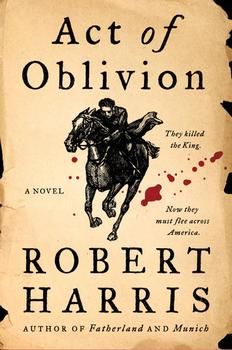Summary | Excerpt | Reviews | Beyond the Book | Readalikes | Genres & Themes | Author Bio

A Novel
by Robert Harris
'That will do well enough.' He showed him the result in the mirror, then handed him the scissors and took his place in the chair. 'Now you trim me.'
Will hesitated. His father-in-law had always been a man of distinguished appearance, what with his embroidered waistcoats and his fine shoes, and his splendid house in King Street next to Whitehall Palace. The Levellers were not the only ones who had accused him of vanity. The old man must miss it all, surely, yet not once had he complained. Under the strain of the past year, his hair had turned entirely grey.
He made a tentative cut.
'Hack away, Will,' commanded Ned cheerfully, but as he watched the clumps start falling to the floor, he noticed they were the colour of goose down, and when he picked up the mirror and studied himself, he realised with a shock that he had become grizzled, like one of the old Royalist soldiers begging in the City of London. He put the mirror aside.
Half an hour later, when they came down to the kitchen for supper, their appearance was transformed. They had discarded their stinking leather army jackets. They smelled clean from the river. Sitting in their shirtsleeves at the table with the Gookin family, the pair looked no different to any of the other Englishmen of Massachusetts, for which, thought Mary Gookin, God be thanked. Perhaps they would pass unnoticed after all.
Daniel bowed his head. 'Blessed by thy holy name, O Lord, for these thy good benefits wherewith thou has refreshed us at this time. Lord forgive us all our sins and frailties, save and defend thy whole church in these times of trouble, and grant us health, peace, and truth, in Christ our only Saviour. Amen.'
'Amen.'
Daniel looked up, smiled, and spread his hands. 'Eat.'
It was a simple enough supper – fresh-baked bread, cheese, pickled tongue – and their visitors set about it like men half starved, although they tried to show the residue of good manners, breaking their bread into small pieces and finishing each mouthful before wolfing down another. Daniel fetched a jug of beer. Ned accepted, but Will declined, and Daniel remarked to his wife, as if in explanation of his abstinence, 'Will's father was a minister of strict Puritan principles.'
'Is that so, Colonel Goffe?' she asked politely.
Will swallowed his bread before replying. 'Most strict. He refused to make the sign of the cross during baptism, or permit the exchange of rings in the marriage service, or wear a surplice. He signed a petition to the King objecting to such practices and lost his living in Sussex because of it. He was obliged to move to Wales.'
'Now that is a harsh punishment for any man,' said Ned.
Will smiled and shook his head. 'You must excuse him, Mrs Gookin. I've had to suffer these jokes for years. I was born in Wales, you see – as you may perhaps tell from my voice.'
Mary smiled. 'Then you are not Welsh, I take it, Colonel Whalley?'
'No, God be thanked, I am a Nottinghamshire man.' Ned drank his beer. 'But Wales breeds good preachers, I must grant them that, and Will here is blessed with the gift. Oliver thought him the finest speaker in the army.'
Oliver. The easy familiarity with which he dropped the name silenced the table, and Gookin couldn't resist explaining to the children, 'Ned was the Lord Protector's cousin.'
He regretted it at once. Mary gave him a sharp look, while the young ones lit up with interest.
'What was he like?'
'Did you see him often?'
'Tell us about the Protect Her, Ned ...'
Ned laughed, held up his hand. 'Too many questions all at once.'
'But you knew His Highness well?'
'Aye, aye, well enough.'
He could have said that they had been born within a year of one another, were friends from boyhood, went around together at university, rode and hawked and gambled together – this was before Oliver's conversion – shared a house in London for a time before they were both married; that Oliver had persuaded him to become a soldier, promoting him in time to be commissary general of the entire English cavalry, that they had fought together at Marston Moor and Naseby and a dozen other battles, that during Cromwell's rule he was in charge of the Protector's military security, that he was a witness at his deathbed, that but for Oliver he would have lived an obscure life as an unsuccessful cloth merchant and a failed farmer, he would never have signed the King's death warrant, and therefore would not have found himself here in his old age on the other side of the world sleeping in an attic.
Excerpted from Act of Oblivion by Robert Harris. Copyright © 2022 by Robert Harris. Excerpted by permission of Harper. All rights reserved. No part of this excerpt may be reproduced or reprinted without permission in writing from the publisher.
Music is the pleasure the human mind experiences from counting without being aware that it is counting
Click Here to find out who said this, as well as discovering other famous literary quotes!
Your guide toexceptional books
BookBrowse seeks out and recommends the best in contemporary fiction and nonfiction—books that not only engage and entertain but also deepen our understanding of ourselves and the world around us.